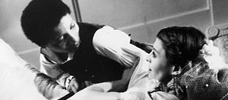Reviews
Sally Potter
UK / Russia / France / Italy / Netherlands, 1992
Credits
Review by Jenny Jediny
Posted on 17 February 2008
Source Sony Pictures Classics DVD
Categories The Lyricism of Sally Potter
There is a charmed aura to Sally Potter’s Orlando, particularly that of a director demonstrating not only self-assurance, but joy in her work. Adapting Virginia Woolf’s dense 1928 novel could not have been an easy task, and yet Potter’s script is blithe and witty, casually accepting the paradox of Woolf’s story and asking that we do the same. Woolf’s Orlando is a “biography” of an Elizabethan man who does not grow old, but undergoes a metamorphosis, becoming a woman - but remaining the same person - halfway through the novel. Now considered a literary landmark for gender studies, the book is an obvious match for Potter, considering her previous treatises on feminist film theory. Potter’s Orlando pushes the material beyond gender, however, into an affecting exploration of both art and identity.
While there are clearly masculine and feminine issues addressed, as Orlando’s gender will alternate, Potter is playful in establishing a blurry line between what makes one a “man” as opposed to a “woman.” Dividing the film into historical periods, Potter landmarks centuries with encompassing life experiences, subtitling sections “Death,” “War” for another, “Love,” “Society,” “Sex,” and eventually, “Birth.” (The last perhaps, leans a bit more toward one gender than another, but Potter cleverly modifies the concept). Situations repeat, and reverse themselves; “Love,” as experienced by the male Orlando, is tumultuous, when a feisty Russian princess rebukes his love, or rather, his declaration of possession through mere adoration. Similarly, the female Orlando will later disappoint a male suitor, pointing out that he cannot win her love through one-sided worship - both rejected men comment on the “treachery of women,” whereas Potter displays the humorous irony of mutual, gender-neutral heartbreak.
Much of the humor in Orlando can be attributed not only to Potter’s writing, but also to Tilda Swinton’s performance as the title character. Physically Swinton pulls off both sexes, and also invokes the self-referencing style of Woolf with a poised, affable tone that is key in the film connection with the viewer. Rather than the detached manner of many period pieces, Orlando’s postmodern glances and comments to the camera add warmth, bridging not merely gaps in time, but the distance between the viewer and subject - the experiences occurring are indeed on screen, but are tangible, universal experiences in some sense, despite class, time, or gender.
On the other hand, Orlando offers an impossible experience: the ability to not merely time travel, but to experience various states of existence. Orlando’s life as a woman touches on this with a bit more depth, as these sequences take place during time periods of female subjugation in European society. While the male Orlando has no issue maintaining upper class social status as a bachelor, the female Orlando is labeled a lost “creature” due to a lack of husband or father (necessary for female guidance, of course). Orlando eventually loses her vast estate, a moment she does not find tragic, but instead fully embraces. This ability to survive, and Orlando’s willingness toward reinvention mirrors Potter’s perceptive commentary on creation within the film; Orlando is indeed a conception, certainly of gender, but also of the constantly evolving self. Consider the final sequence of “Birth;” Orlando has now arrived in the modern world, with not merely a daughter, but a novel that will be published. As the novel is a story of “her” life, Potter’s film is a collection of life’s experiences, the passage of time we all inevitably face. Orlando’s written expression of these events, in conjunction with her actual child, finally brings her the relief she has sought for centuries, and the assurance that she will live on in more ways than one.
Orlando’s effortlessness shows maturity, a sense of moving forward. Nearly a decade before embarking on this project, Potter experienced harsh rejection with The Gold Diggers, but clearly took the experience as an opportunity to grow, maintaining her individual vision as a filmmaker. The sumptuous result, Orlando, offers a lively challenge; in the words of Queen Elizabeth I, who instructs Orlando, “Do not fade. Do not wither. Do not grow old,” Potter dares us - and herself - to keep evolving, whether in life or art, despite our mortality.
More The Lyricism of Sally Potter
We don’t do comments anymore, but you may contact us here or find us on Twitter or Facebook.








